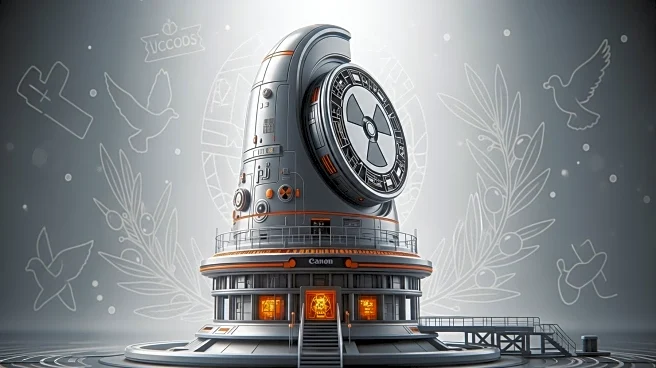What's Happening?
Iran's Supreme National Security Council has issued a warning that the reimposition of UN sanctions would halt its cooperation with the International Atomic Energy Agency (IAEA). The council, led by President Pezeshkian, highlighted that efforts by Britain, France, and Germany to reinstate these sanctions could severely impact future negotiations and cooperation on Iran's nuclear program. The council's statement, broadcasted on state television, emphasized that such actions would 'effectively suspend' Iran's engagement with the IAEA, raising concerns about the potential resumption of uranium enrichment practices. Iranian hardliners are pushing for withdrawal from the Nuclear Non-Proliferation Treaty (NPT) and advocating for nuclear weapon development in response to the anticipated sanctions. The UN Security Council's recent failure to pass a resolution to prevent the sanctions' reinstatement has intensified these tensions.
Why It's Important?
The potential reimposition of UN sanctions on Iran could have significant implications for international diplomacy and nuclear proliferation. If Iran halts cooperation with the IAEA, it may resume uranium enrichment, escalating tensions in the Middle East. This development could destabilize regional security and complicate diplomatic efforts to manage Iran's nuclear ambitions. The geopolitical divisions, highlighted by support for sanctions relief from China, Russia, Pakistan, and Algeria, underscore the complexity of international relations surrounding Iran's nuclear program. The situation poses challenges for global nuclear oversight and could influence future policy decisions by major international stakeholders.
What's Next?
Without intervention from the UN Security Council, international sanctions on Iran are set to be reinstated next month. This could lead to further diplomatic efforts to prevent escalation and manage Iran's nuclear activities. The IAEA and international community may need to explore alternative strategies to engage Iran and ensure compliance with nuclear regulations. The unfolding scenario requires careful monitoring as it could impact regional stability and international relations.
Beyond the Headlines
The potential halt in Iran's cooperation with the IAEA raises ethical and legal questions about nuclear proliferation and international accountability. The advocacy for nuclear weapon development by Iranian hardliners could shift long-term geopolitical dynamics in the Middle East. The situation highlights the challenges of balancing national security interests with global nuclear non-proliferation goals.









